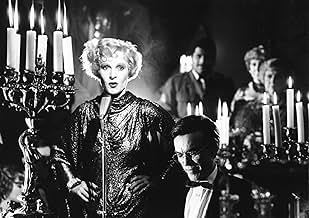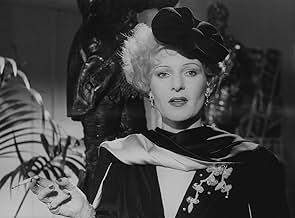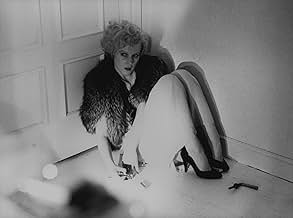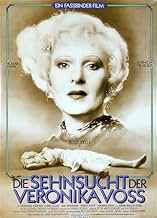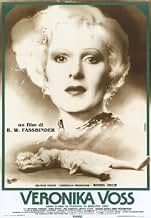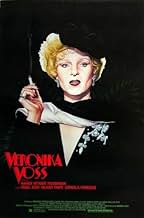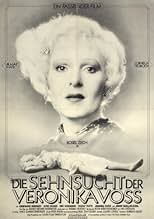NOTE IMDb
7,6/10
8,1 k
MA NOTE
Une actrice déchue du cinéma allemand, retenue par son médecin, éveille les soupçons d'un journaliste sportif.Une actrice déchue du cinéma allemand, retenue par son médecin, éveille les soupçons d'un journaliste sportif.Une actrice déchue du cinéma allemand, retenue par son médecin, éveille les soupçons d'un journaliste sportif.
- Réalisation
- Scénario
- Casting principal
- Récompenses
- 4 victoires et 4 nominations au total
Günther Kaufmann
- G.I.
- (as Günter Kaufmann)
- …
Avis à la une
Like many other Fassbinder films "Die Sehnsucht der Veronika Voss" tells about a decline and is very depressing. It is a visually stunning film that shows how much Fassbinder admired the classical Hollywood cinema and especially the films of Douglas Sirk. Like the films of his idol this film is stylish and artificial to an extreme extent which creates quite a distance between itself and the audience. Probably an even greater distance, since the style and the artificiality are used more consciously here, even as a instrument of alienation. So it is more fascinating than touching or even moving and might leave one even cold. Nevertheless the story is intriguing and it really tells something about the post war society in West Germany, so the film is interesting and even fascinating to watch. The scene where Rosel Zech as Veronika sings "Memories Are Made Of This" is very haunting, a gem.
This movie left me feeling rather low. Its world is quite bleak. People are either strong or weak in the face of a society that feels cold. Looks like being strong won't make any difference in the long run. A very sad tale with beautiful black and white photography.
In a career spanning a mere sixteen years, Rainer Werner Fassbinder made forty-four films before his death at just thirty-six, which occurred a few months after the premiere of this, the final part of what has come to be designated as his BRD Trilogy.
It is beautifully written by his regular collaborators Peter Marthesheimer and Pea Froelich, shot in knife-like black and white by his preferred cinematographer Xavier Schwarzenberger and as one would expect from this director, features a strong leading role for an actress, in this case Rosel Zech, whose character is loosely based upon that of the fascinating but tragic Sybille Schmitz who despite never being fully accepted by Herr Goebbels and company found it virtually impossible to continue her post-war career because of her perceived Nazi connections and whose drug-fuelled downward spiral ended in suicide in 1955.
Zech is simply stupendous in a demanding role that requires a wide range of emotions and as a bonus she performs a beguiling, Dietrich-like rendition of 'Memories are made of this." As a lesbian Dr. Feel-good, there is a magnificently chilling performance by Annemarie Dueringer. The entire cast is uniformly excellent and all of the characters are well drawn. Armin Mueller-Stahl again makes his presence felt whilst the influence of America in the Germany of the time is epitomised by the sound track and not least by the presence of the ubiquitous African-American GI played as always by Guenter Kaufmann. As well as being a tribute to the mighty UFA Studios, the relationship between fading star Voss and the journalist of Hilmar Thate is a nod to 'Sunset Boulevard'.
There is an absence of socio-political comment here and the whole enterprise succeeds solely through the myths of the movies. Fassbinder was an avowed devotee of the dream factory that was Hollywood and professed his adoration for Douglas Sirk. As it happened the master long outlived the pupil and Sirk offered a fitting tribute:"Although his fims were controversial.....only those things that survive opposition have the power of permanence."
It is beautifully written by his regular collaborators Peter Marthesheimer and Pea Froelich, shot in knife-like black and white by his preferred cinematographer Xavier Schwarzenberger and as one would expect from this director, features a strong leading role for an actress, in this case Rosel Zech, whose character is loosely based upon that of the fascinating but tragic Sybille Schmitz who despite never being fully accepted by Herr Goebbels and company found it virtually impossible to continue her post-war career because of her perceived Nazi connections and whose drug-fuelled downward spiral ended in suicide in 1955.
Zech is simply stupendous in a demanding role that requires a wide range of emotions and as a bonus she performs a beguiling, Dietrich-like rendition of 'Memories are made of this." As a lesbian Dr. Feel-good, there is a magnificently chilling performance by Annemarie Dueringer. The entire cast is uniformly excellent and all of the characters are well drawn. Armin Mueller-Stahl again makes his presence felt whilst the influence of America in the Germany of the time is epitomised by the sound track and not least by the presence of the ubiquitous African-American GI played as always by Guenter Kaufmann. As well as being a tribute to the mighty UFA Studios, the relationship between fading star Voss and the journalist of Hilmar Thate is a nod to 'Sunset Boulevard'.
There is an absence of socio-political comment here and the whole enterprise succeeds solely through the myths of the movies. Fassbinder was an avowed devotee of the dream factory that was Hollywood and professed his adoration for Douglas Sirk. As it happened the master long outlived the pupil and Sirk offered a fitting tribute:"Although his fims were controversial.....only those things that survive opposition have the power of permanence."
A man runs into a pretty but aging woman in the middle of a rainstorm. He politely protects her from the downpour with his umbrella, and even lifts her over a fence so she can get to her bus. He also gets on the bus, and, beginning to pant, she declares that she can't go near anyone else on the bus, because she's a famous actress and she'll be thronged. The other passengers on the bus look up at the exasperated woman, but don't pay her any more mind than that. A bit later, the woman proudly tells the man that she is Veronika Voss, and all he can do is politely nod. She hasn't been in a movie for three years, and hasn't been in a good one for longer than that. Veronika has to try really hard to pin the man, Robert, down and seduce him, and even when she accomplishes this feat he doesn't seem particularly interested. Robert's interest does grow when he begins to discover some nasty secrets about her life, notably that she is addicted to morphine. A strange doctor seems to be little more than a local drug dealer when he begins to look into the situation.
The plot is decent; it would have been a really good one for a classic Hollywood film starring Joan Crawford or Bette Davis or someone like that. Its greatest worth is in the performance of Rosel Zech, who has the titular role. Cornelia Froboess as Robert's girlfriend and Annemarie Düringer as the wicked doctor are also good. The character of Robert is never very interesting. The black and white cinematography (Xaver Schwarzenberger) and the unconventional score (Peer Raben) are very good. The tape I watched was not in a very good condition, so I may have liked it more if I had seen a better copy. 8/10.
The plot is decent; it would have been a really good one for a classic Hollywood film starring Joan Crawford or Bette Davis or someone like that. Its greatest worth is in the performance of Rosel Zech, who has the titular role. Cornelia Froboess as Robert's girlfriend and Annemarie Düringer as the wicked doctor are also good. The character of Robert is never very interesting. The black and white cinematography (Xaver Schwarzenberger) and the unconventional score (Peer Raben) are very good. The tape I watched was not in a very good condition, so I may have liked it more if I had seen a better copy. 8/10.
This sumptuous black and white period piece, tells the story of a once famous film star, Veronika Voss (Rosel Zech). After a chance encounter on a bus with Robert Krohn (Hilmar Thate), there lives are entwined, with Krohn finding himself trapped in a cat-and-mouse search for Voss's sanity, her past lives, and the many sycophants and gold diggers in 1950's Germany. Voss, now struggling to find work after a highly successful period, particularly in the 1940's, is addicted to drugs and alcohol and has paranoid delusions when out on the street; Krohn is pulled into this as he did not recognise who she was, and she vaguely sees him as protection.
One of the last of Fassbinder's films - he died of an overdose (the official conclusion was suicide) in 1982 - which was also the last of a trilogy focusing on Germany's economic boom in the 1950's (the others being The Marriage of Maria Braun (1979) and Lola (1981)), the film also reflects some of the themes that the New German Cinema at the time. It was a time that Germany was reflective of World War 2, and the trauma that prevailed in a country torn between guilt and a resurgence of decadence and wealth as in the 1920's Weimar Republic. It is stated in the film that Voss's best period was during this period, and that she had been the star of Nazi Germany. After the fall of Nazi domination, she was cast aside.
Like Billy Wilder's Sunset Boulevard (1950), Veronika Voss highlights an industry that can easily create monsters, and also devastate lives. But unlike Wilder's subtle version of lost fame, Fassbinder shows the devastating effects of drug addiction, and the underbelly of society that is encountered in this process. Historically though, this is deeper and a hell of a lot more emotionally charged and interesting than Sunset. After all, this is not a Hollywood story, but is a post-World War 2 story of judgement, and loss after such a integrally debasing event in human history. How do you continue after working under the despotic power of the Nazi party? The elements of Nazi Germany are still in process, in the form of Veronika's control.
The film is said to be based upon the real-life German film actress, Sybille Schmitz, who died of an overdose in 1955 at the tender age of 45. The film shows shows that the shadow of the war had a lasting effect on the German nation, that would take decades to come to terms with. This is film making par excellence. Haunting, beautiful, with a climax that is inevitable, shocking, but very satisfactory. Rosel Zech's performance is pitch perfect, her face in a constant state of anguish.
www.the-wrath-of-blog.blogspot.com
One of the last of Fassbinder's films - he died of an overdose (the official conclusion was suicide) in 1982 - which was also the last of a trilogy focusing on Germany's economic boom in the 1950's (the others being The Marriage of Maria Braun (1979) and Lola (1981)), the film also reflects some of the themes that the New German Cinema at the time. It was a time that Germany was reflective of World War 2, and the trauma that prevailed in a country torn between guilt and a resurgence of decadence and wealth as in the 1920's Weimar Republic. It is stated in the film that Voss's best period was during this period, and that she had been the star of Nazi Germany. After the fall of Nazi domination, she was cast aside.
Like Billy Wilder's Sunset Boulevard (1950), Veronika Voss highlights an industry that can easily create monsters, and also devastate lives. But unlike Wilder's subtle version of lost fame, Fassbinder shows the devastating effects of drug addiction, and the underbelly of society that is encountered in this process. Historically though, this is deeper and a hell of a lot more emotionally charged and interesting than Sunset. After all, this is not a Hollywood story, but is a post-World War 2 story of judgement, and loss after such a integrally debasing event in human history. How do you continue after working under the despotic power of the Nazi party? The elements of Nazi Germany are still in process, in the form of Veronika's control.
The film is said to be based upon the real-life German film actress, Sybille Schmitz, who died of an overdose in 1955 at the tender age of 45. The film shows shows that the shadow of the war had a lasting effect on the German nation, that would take decades to come to terms with. This is film making par excellence. Haunting, beautiful, with a climax that is inevitable, shocking, but very satisfactory. Rosel Zech's performance is pitch perfect, her face in a constant state of anguish.
www.the-wrath-of-blog.blogspot.com
Le saviez-vous
- AnecdotesBased on the true story of German film star Sybille Schmitz.
- GaffesThe film is set in 1955 but the song "The Battle of New Orleans" by Johnny Horton, released in 1959, is heard on the radio a number of times.
- Citations
Dr. Marianne Katz: Artists are different from ordinary people. They are wrapped up in themselves, or simply forgetful.
Meilleurs choix
Connectez-vous pour évaluer et suivre la liste de favoris afin de recevoir des recommandations personnalisées
- How long is Veronika Voss?Alimenté par Alexa
Détails
- Date de sortie
- Pays d’origine
- Langues
- Aussi connu sous le nom de
- Veronika Voss
- Lieux de tournage
- Sociétés de production
- Voir plus de crédits d'entreprise sur IMDbPro
Box-office
- Budget
- 2 600 000 DEM (estimé)
- Montant brut aux États-Unis et au Canada
- 8 144 $US
- Week-end de sortie aux États-Unis et au Canada
- 11 623 $US
- 16 févr. 2003
- Montant brut mondial
- 8 158 $US
- Durée
- 1h 44min(104 min)
- Couleur
- Mixage
- Rapport de forme
- 1.66 : 1
Contribuer à cette page
Suggérer une modification ou ajouter du contenu manquant

